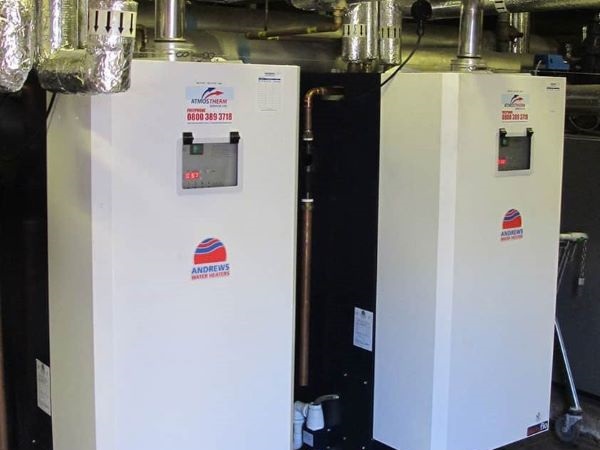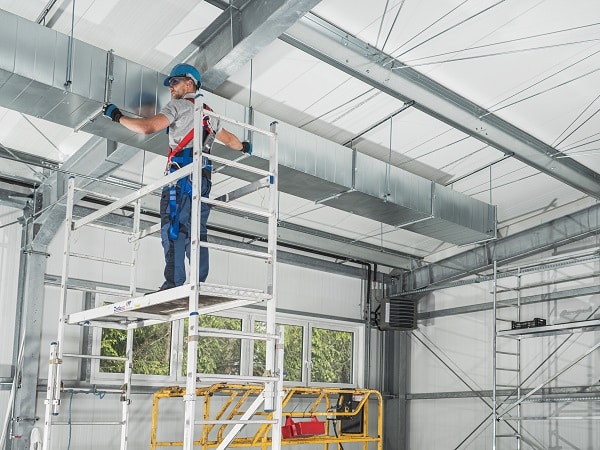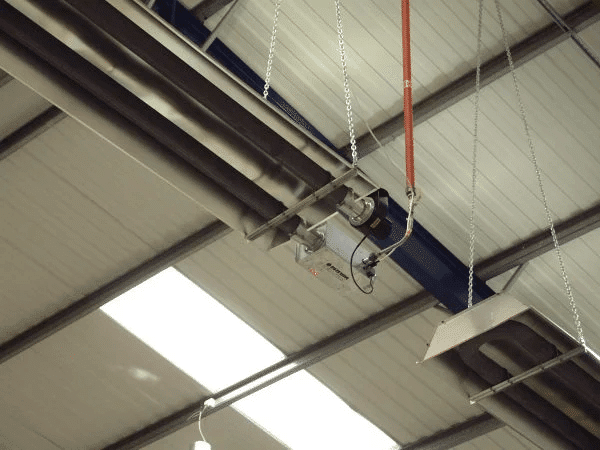Are Commercial Heat Pumps Worth It?
Thinking of upgrading the heating system in your business premises to something more eco-friendly with lower running costs? Then an air or ground source heat pump is one option that could help lower your carbon emissions. And save you money in the long run! However, the upfront installation cost can be a cause of concern for some – namely small business owners. With that in mind, we’re looking into the pros and cons of installing a commercial heat pump. And whether this new technology is really worth the investment. Keep reading to find out…
How does a heat pump work?
Unlike traditional boilers that use fossil fuels to generate heat, commercial heat pumps transfer heat from the outside air or ground. As such, they usually include an outdoor unit with a compressor and refrigerant, connected to an indoor unit for distributing the heated air.
The process involves a refrigerant flowing through the pump, absorbing heat and being turned into a gas. This gas is then compressed to boost its temperature, before being fed through a heat exchanger to warm your radiators and provide hot water.
Air source heat pumps are the best-known and work by extracting heat from the air outside. They look and work like air conditioning units, just in reverse. Ground source heat pumps, meanwhile, absorb heat from beneath the ground through a network of pipes filled with refrigerant. The warmed liquid is then compressed as it circulates up to your heating system.
Commercial air source heat pumps vs ground source heat pumps
When it comes to choosing between the two types of commercial heat pump, there are several factors to consider…
Firstly, commercial air source heat pumps are typically cheaper and easier to install, making them a good option for smaller firms. What’s more, they are relatively compact, so will only take up a small amount of wall space. Just make sure the unit has good airflow!
Thanks to ever improving technology, most air source systems work well down to around -15°C. However, it’s worth noting that these pumps do become less efficient the more temperatures drop – particularly below zero degrees.
Meanwhile, commercial ground source heat pumps cost more to install largely due to the excavation work involved. Baring that in mind, you’ll also need land around your premises that can be dug up for pipes to be buried. That aside, ground source heat pumps tend to be more efficient and therefore more cost-effective long term. Namely because ground temperatures maintain a stable temperature compared to the air, so the pump doesn’t have to work as hard.
Pros and cons of heat pumps for businesses
Lower running costs
As mentioned, air source heat pumps repurpose heat from the air, whilst ground source heat pumps take it from the earth. In both cases, the energy they utilise is renewable and free of charge. You’ll also benefit from much greater efficiency, as heat pumps supply between 3-4 units of heat for every 1 unit of electricity. Due to this, you won’t have to worry too much about increasing costs. And you can wave goodbye to high gas, oil or LPG fuel bills for good! In fact, you could save around £3,000 per year on energy compared to running a gas boiler.
Reduced carbon emissions
Under the Energy Savings Opportunity Scheme, any UK business employing over 250 people must complete energy audits every four years. This includes reporting energy usage, carbon emissions and measures in place to improve efficiency. With that in mind, upgrading your heating system is one area where you could make improvements. Namely, by swapping your standard electric or gas heating for a heat pump to reduce your CO2 output by around 65%! This may also make your company more attractive to increasingly eco-conscious customers.
Versatile heating systems
Another benefit of commercial heat pumps is how versatile they are. Some systems feature a reverse valve that enables them to be used as air conditioners in summer. You can also install multiple units within one system for larger commercial spaces, without needing lots of room. In fact, they can be wall mounted in a neat stack! And if you find that you need an extra energy boost to meet high heating and hot water demands, don’t worry. Heat pumps can be used with solar panels or underfloor heating systems to ensure your premises are adequately heated.
Government initiatives available
Worried about the initial outlay needed to install a commercial heat pump? Whilst air source systems cost upwards of £6,000 and ground source pumps even more, support is available. To boost green energy usage, the Government has several schemes to make heat pumps more affordable.
Some businesses (alongside homeowners) may be eligible for a Boiler Upgrade Scheme Grant of up to £7,500. To be eligible, you must own the property you’re applying for, be replacing a fossil fuel system and have a valid Energy Performance Certificate (EPC). If not, you can still benefit from no VAT on heat pump installations until 2027. Plus, you can claim capital allowances on low or zero-carbon technology, reducing the tax you’ll have to pay.
Disadvantages of commercial heat pumps
Despite their many benefits, there are a small number of downsides to heat pumps that are worth considering. Firstly, your premises must be well insulated to maximise the system’s efficiency. Commercial heat pumps therefore don’t work well in warehouses with thin walls and frequently opened shutters. In this case, we may suggest a radiant heating system instead. Likewise, heat pumps may not be suitable for older properties lacking cavity wall insulation.
Additionally, you may need to budget more time and money for the project if larger radiators or pipe upgrades are needed. The reason for this is that heat pump systems run at lower temperatures than traditional boilers. So, in order to achieve the same level of comfort, a larger surface area is needed to radiate heat from.
What’s more, if you opt for a more efficient ground source heat pump, the upfront cost will be greater – typically at least £16,000. You can also expect more disruption during installation due to the earthworks involved in laying the pipes. But it may well be worth it in the end…
The verdict: are commercial heat pumps worth it?
Given that commercial heat pumps can last over two decades with little upkeep required, they could prove a valuable investment for many businesses. Especially when you consider the huge 30-50% cost savings you can look forward to by dramatically reducing your energy usage! You’ll also be making your company more environmentally friendly and future-ready in the process, as oil and gas boilers are set to be phased out over the next decade.
So, what are you waiting for? Get in touch to discover the possibilities! Our renewable heating engineers have over 40 years of experience serving businesses of all sizes located within 100 miles of Manchester. We’ve also worked on numerous renewable heating projects and helped design systems with advanced temperature and anti-tampering controls. Just let us know what you need! Book a free site-survey complete with no-obligation estimate to get started.
Speak to a HVAC expert today
Enter your details below to get a call back from one of our HVAC experts.



